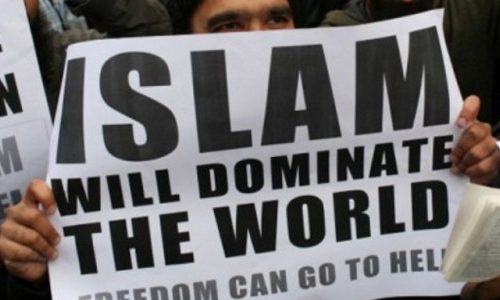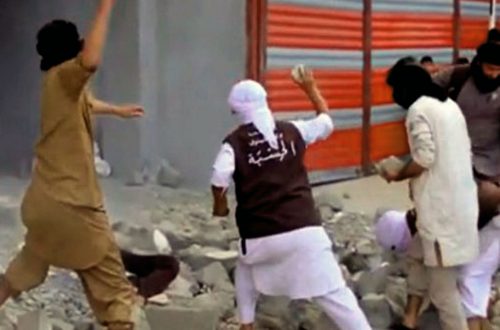This is a guest post by Graham Reid
Until recently, STREET (Strategy To Reach Empower Educate Teenagers) was a major beneficiary of Prevent funding. From Bob Lambert to the eminently more sensible Jamie Bartlett of Demos, STREET has been lauded as a bulwark against violent extremism. Since their funding was cut, however, their website has given a few clues as to why they should never have received Government money in the first place.
STREET are Salafists. They preach a deeply conservative strand of Islam, but they are absolutely opposed to terrorism. The prevailing line (particularly in security service circles) has been that they have the ‘credibility’ to discourage young extremists from carrying on and committing a violent act.
Of course, Salafism is no monolith. At one end of the spectrum are interpretations which advocate a live-and-let-live style approach to life. They may have religious beliefs about homosexuality and women’s clothing that are antithetical to modern British values, but they have no interest in forcing these upon others. Equally as importantly, they reject all forms of violence.
At the other extreme, however, are Salafi-Jihadists like al-Qaeda. Religiously they agree with much that other Salafists believe, but their views are much more violent and have been politicised. They believe in using violence to create an ‘Islamic state’ which would use force to ensure that all of its citizens behave in accordance with Salafist beliefs.
Between non-violent Salafists and Salafi-Jihadists lie Saudi-style Wahhabis. They tend to avoid direct confrontation with the state, but retain a very politicised and conservative view of Islam. For example, they will talk about creating an ideal ‘Islamic state’ in which adulterers would be stoned to death, but acknowledge they shouldn’t do that right now. They will typically reject the idea of violence in Saudi Arabia, the UK or US, but support it in Israel or Afghanistan.
The question is, can STREET successfully draw a line between its beliefs and more intolerant and violent strands of Salafism such as Wahhabism and Salafi-Jihadism? Or are STREET, and those who support it, being too clever for their own good: relying on nuances which oppose violence in theory but which make little practical sense.
Since STREET lost its Government funding, a number of articles have been posted to its website which raise serious questions about the organisation. In particular, they suggest that individuals within STREET may admire some of the most extreme Wahhabi preachers out there.
Here, for example, STREET posts an article on ‘The ruling of music and singing in Islam.’ STREET credits the preacher Salih al-Munajjid and his website ‘Islam Q&A’ as its source. Here is Islam Q&A discussing homosexuality:
“The one to whom it is done is like the one who does it, because they both took part in the sin. So both are to be punished by execution, as it says in the hadeeth.”
“Physical jihad against the kaafirs [unbelievers] becomes obligatory in four cases, which are:
1 – When the Muslim is present in a jihad situation.
2 – When the enemy has come and attacked a Muslim land
3 – When the ruler mobilizes the people, they must respond.
4 – When a person is needed and no one else can do the task except him.”
“The punishment for apostasy (riddah) is well-known in Islaamic Sharee’ah. The one who leaves Islaam will be asked to repent by the Sharee’ah judge in an Islaamic country; if he does not repent and come back to the true religion, he will be killed as a kaafir and apostate, because of the command of the Prophet (peace and blessings of Allaah be upon him): “Whoever changes his religion, kill him.” (Reported by al-Bukhaari, 3017).”
And here is al-Munajjid on Jews:
“The Jews distorted the religion of Allah…murdered the prophets and denied the existence of Allah; they are intriguers, frauds, and traitors…bringing corruption to Muslim communities…set fire to the Al-Aqsa Mosque…desecrated the Quran…committed massacres; so how is it possible for Muslims not to rejoice at murdering the infidel, thieving Jews? Moreover, Allah will satisfy his believers by destroying and exterminating them all. This is our right as Muslims as was promised by our Prophet….Allah will bring us to defeat and master them according to the Islamic tradition: Fight the Jews and defeat them until the rock says: ‘O Muslim, there is a Jew behind me, come and kill him!”
STREET’s website also features an article by Haitham al-Haddad. Al-Haddad is a fan of Hamas and here is a video of him discussing the 2009 clashes between the Israeli Defence Force and Hamas:
“They say “is it worth it”? We always say that the conflict between Islam and the enemies of Islam is an on-going conflict and we should pay a very high price for us, for Muslims, to gain their victory. And we should realise that victory cannot be gained easily and we should be ready to pay the price for this victory from our blood and Muslims are ready to do so.
One of the main benefits of this conflict, this war, Alhamdulillah (praise God), is that many Muslims who left their religion became more convinced that they have to go back to their religion, and they became more convinced that the only solution for Islam to be in power, in order for justice to prevail, is for Muslims to go back to their religion.
It is very, you can say, very promising, it gives hope, when you see, and I have heard that myself, one of the protesters in Morocco …there was one lady, and she said, she said so many things, and she said, “I would like to tell you clearly that I am a secular, I am a secular, I am a secular, however, I believe strongly in jihad. I believe strongly in jihad. I believe strongly in jihad.”
…
What has happened, it clearly encouraged Muslims to prepare themselves for jihad, all over the world.”
STREET even posted a video entitled ‘The Dangers of Extremism’. In it, Abu Usamah al-Dhahabi attempts to deny claims he is an extremist. Judge Abu Usamah’s views for yourself:
“[Quoting a hadith] ’Whoever changes his religion, then kill him.’ Whoever changes his religion, then kill him. That’s not talking about the Yahoudi [Jew] who changes his religion from Yahoudiyya [Judaism] to Nasraniya [Christianity] … This is talking about the Muslim – man or woman – who changes their religion from al-Islam to anything else. Kill them, in the Islamic state … So the Muslim who changes his religion, the penalty for that is death…”
Of course, there is a difference between killing apostates in London and killing them in a hypothetical future ‘Islamic state’. But STREET is still encouraging young Muslims to look for guidance to two individuals who support the theory, if not the practice, of killing apostates. The danger of this position is that, once somebody has accepted it, they are significantly closer to Salafi-Jihadism than they would be if they believed in religious freedom.
All a Salafi-Jihadist would have to do is argue that the death penalty can be applied anywhere, not just in an Islamic state. Rejection of al-Qaeda’s ideology is therefore dependent only on an understanding of nuanced arguments regarding where penalties can and cannot be applied. This is far weaker (and more difficult for young people unfamiliar with theological debate) than opposing Salafi-Jihadism on the grounds that killing anyone – even apostates – is wrong.
Of course, if STREET were working only with dedicated terrorists this would be much less of a problem. If you can persuade somebody who advocates violence in the here-and-now to defer it until an ‘Islamic state’ has been established, then that is a step in the right direction. However, it is clearly retrograde to facilitate the spread of these views to people who previously opposed all forms of intolerance and violence.
Nobody is suggesting that STREET endorses any of the views discussed above. However, at the very least they appear to have some admiration for Wahhabi preachers. Many people, including the young people it is supposed to influence against violence, will see the hosting of material from these figures on STREET’s website as an endorsement of them and their views.
The problem is that there is such a thin line between STREET’s brand of Salafism and those of more violent Wahhabis (and even Salafi-Jihadists) that even they cannot draw it accurately. This is what led STREET to promote individuals and websites whose views on certain key subjects are deeply disturbing.
This has happened before. In the early-to-mid-2000s, various Salafist groups such as JIMAS embraced Anwar al-Awlaki (although, several years later, they have now completely disassociated themselves from him). Awlaki thereby became a popular and respected figure, a position he now exploits to promote al-Qaeda.
This underlines the danger of empowering Wahhabi-influenced Salafists likes STREET. They personally may disagree with Salafi-Jihadism, but only because of nuances, not fundamental differences, separating their beliefs. This creates the risk that they will accidentally promote more extreme forms of Salafism because they themselves cannot tell the difference.
Moreover, the fine nuances that separate Wahhabi support for violence (in limited circumstances) from Salafi-Jihadist ideology are far from a bulwark against terrorism. Quite the opposite, in fact, as demonstrated by the vast number of Saudi Wahhabis who move on to support and even join al-Qaeda.
This is not to suggest that STREET don’t want to identify and challenge violent extremists. The problem is that their Salafist beliefs and apparent admiration for Wahhabi ideologues leave them without the tools to do so effectively.


